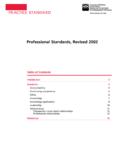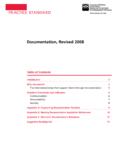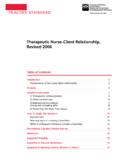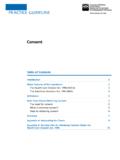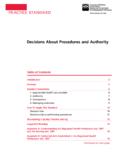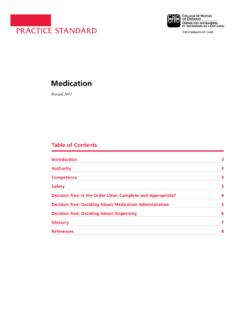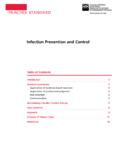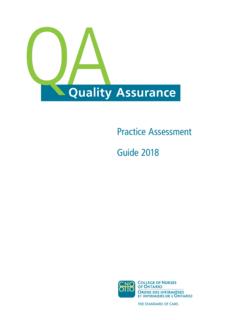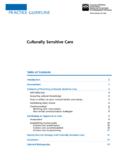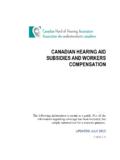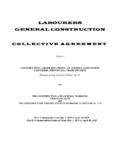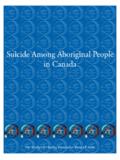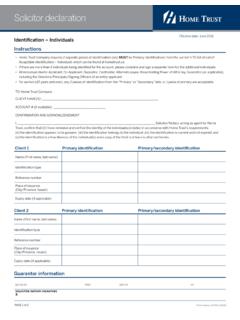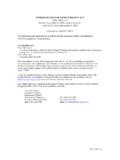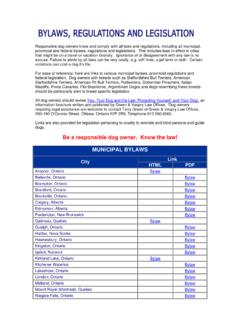Transcription of Core Competency Framework - CNO
1 Canadian Nurse Practitioner core Competency FrameworkMay 2010 This document has been developed collaboratively by the Canadian Nurses association and representatives of the provincial/territorial regulatory organizations, with assistance from Canada s Testing Company, Assessment Strategies rights reserved. No part of this document may be reproduced, stored in a retrieval system, or transcribed, in any form or by any means, electronic, mechanical, photocopying, recording, or otherwise, without written permission of the publisher. Canadian Nurses association 50 Driveway Ottawa, ON K2P 1E2 Tel.: 613-237-2133 or 1-800-361-8404 Fax: May 2010 ISBN 978-1-55119-329-8 CANADIAN NURSES association 1 TABLE OF CONTENTSP reface .. 3 Acknowledgements .. 4 Introduction .. 5 Purpose of the Framework .. 5 Profile of the Nurse Practitioner .. 5 Overview of Competencies.
2 6 Assumptions .. 7 Competencies .. 8 1. Professional Role, Responsibility and Accountability .. 8 2. Health Assessment and Diagnosis .. 11 3. Therapeutic Management .. 12 4. Health Promotion and Prevention of Illness and Injury .. 13 Glossary of Terms .. 14 Bibliography .. 19 Appendix A: Representatives and Facilitators .. 21 CANADIAN NURSES association 3 PREFACEThe respective executive directors of the registered nursing regulatory bodies in Canada requested the Canadian Nurses association and Canada s Testing Company, Assessment Strategies Inc., to facilitate the update and revision of the core entry-level competencies for nurse practitioner practice in Canada. Through a series of teleconferences, electronic communications, subgroup work and one face-to-face meeting, the Canadian Nurse Practitioner core Competency Framework (2010) was completed.
3 The Canadian Nurse Practitioner core Competency Framework (2010) was developed for use by participating jurisdictions. Each regulatory body may adopt this document or publish the entry-level competencies approved in accordance with their context, policies and requirements. Anyone seeking information about the nurse practitioner competencies that are in effect in a particular province or territory is advised to contact the applicable regulatory Framework defines the core competencies required for safe, competent and ethical nurse practitioner practice. The core competencies are transferable across diverse practice settings and client populations. As a result, the Framework is fundamental to all nurse practitioner practice in first Canadian Nurse Practitioner core Competency Framework , published in 2005, was developed in collaboration with the Canadian jurisdictions through the support of the Canadian Nurse Practitioner This document updates and replaces the 2005 publication.
4 The Framework was revised using a consensus-building approach involving provincial/territorial nursing regulators and expert nurse practitioners across The collaborative approach used to revise the document promotes consistency of registration requirements across the country, facilitating compliance with the Agreement on Internal Nurse practitioner practice is dynamic, and the competencies will change over time in response to population health needs, evolving practice and health-care environments. Hence, this document will be reviewed at least once every five years to ensure that it keeps pace with changes in nurse practitioner A federally funded project, the Canadian Nurse Practitioner Initiative was established in 2004 to facilitate a pan-Canadian Framework for the sustained integration of the nurse practitioner role in Canada. 2 Except in Quebec.
5 3 The Agreement on Internal Trade is an intergovernmental trade agreement that was signed by Canadian first ministers in 1995. Its purpose is to reduce and, to the extent possible, eliminate barriers to workforce mobility. See CANADIAN NURSE PRACTITIONER core Competency Framework ACKNOWLEDGEMENTSA ppreciation and thanks are extended to the regulatory authorities, the Canadian Nurse Practitioner core Competency Committee (see Appendix A), the Registered Nurses association of Ontario, and nurse practitioners across Canada who participated in the development of this document. In particular, the revision of the Framework was made possible by the collaborative efforts of the following organizations: association of Registered Nurses of Newfoundland and Labrador (ARNNL) association of Registered Nurses of Prince Edward Island (ARNPEI) College of Registered Nurses of Nova Scotia (CRNNS) Nurses association of New Brunswick / association des infirmi res et infirmiers du Nouveau Brunswick (NANB) College of Nurses of Ontario (CNO) College of Registered Nurses of Manitoba (CRNM) Saskatchewan Registered Nurses association (SRNA) College and association of Registered Nurses of Alberta (CARNA) College of Registered Nurses of British Columbia (CRNBC) Registered Nurses association of the Northwest Territories and Nunavut (RNANT/NU) Yukon Registered Nurses association (YRNA)CANADIAN NURSES association 5 INTRODUCTIONP urpose of the FrameworkThe Canadian Nurse Practitioner core Competency Framework (2010)
6 Can be either adopted as is or modified by regulatory bodies to suit the particular context of each body. Nursing regulatory bodies may use this document alone or in combination with additional provincial/territorial nurse practitioner documents to support regulatory processes such as: reviewing and approving/recognizing nurse practitioner education programs; developing/approving regulatory examinations for nurse practitioner registration; assessing individual nurse practitioners for initial competence when applying for registration; and assessing continuing competence and providing for ongoing registration of nurse Competency statements describe the integrated knowledge, skills, judgment and attributes that guide nurse practitioner practice. Safe, competent, ethical nurse practitioner practice requires the integration and performance of many competencies simultaneously.
7 This document may be used by nurse practitioners to support their self-reflection, self-evaluation and continuing competence, as well as to educate others about their role. Nurse practitioner educators may use it for curriculum development. And it is a useful resource for helping others including government agencies, employers, health providers and the public to understand what they can expect of nurse practitioners. Profile of the Nurse PractitionerNurse practitioners, as autonomous health professionals with advanced education, provide essential health services grounded in professional, ethical and legal standards. Nurse practitioners integrate their in-depth knowledge of advanced nursing practice and theory, health management, health promotion, disease/injury prevention, and other relevant biomedical and psychosocial theories to provide comprehensive health services.
8 Nurse practitioners work in collaboration with their clients and other health-care providers in the provision of high-quality patient-centred care. They work with diverse client populations in a variety of contexts and practice settings. 6 CANADIAN NURSE PRACTITIONER core Competency Framework Nurse practitioners have the competence to provide comprehensive health assessment, to diagnose health/illness conditions, and to treat and manage acute and chronic illness within a holistic model of care. Nurse practitioners order and interpret screening and diagnostic tests, perform procedures and prescribe medications, while integrating the principles of resource allocation and cost-effectiveness, in accordance with federal, provincial and territorial legislation and policy. Nurse practitioners are accountable for their own practice and communicate with clients about health assessment findings and diagnoses, further required testing and referral to other health-care professionals; they are also responsible for client follow-up.
9 Nurse practitioners counsel clients on symptom management, health maintenance, pharmacotherapy, alternative therapies, rehabilitation strategies and other health practitioners have the knowledge to assess population health trends and patterns and to design services that promote healthy living. They provide leadership in the development, implementation and evaluation of strategies to promote health and prevent illness and injury, and they work with interprofessional teams, other health-care providers and sectors and community members. Nurse practitioners collaborate in the development of policy to influence health services and healthy public of CompetenciesNurse practitioner competencies reflect advanced nursing practice by building and expanding upon the competencies required of a registered nurse. This document expands on the competencies defined in Advanced Nursing Practice: A National Framework4 as these competencies apply to nurse practitioners.
10 The core competencies in this Framework are organized into four categories: Professional Role, Responsibility and Accountability; Health Assessment and Diagnosis; Therapeutic Management; and Health Promotion and Prevention of Illness and competencies were developed according to certain assumptions and terms; thus, interpretation of the competencies requires an understanding of the assumptions and the key terms found in the glossary of Canadian Nurses association , NURSES association 7 ASSUMPTIONSF amiliarity with the assumptions used to develop the core competencies is essential to the understanding of how these competencies may be applied to the nurse practitioner practice in all roles and settings, not only those specific to a particular client population or practice environment. In developing the core competencies listed in this document, the following assumptions were made: 1.
